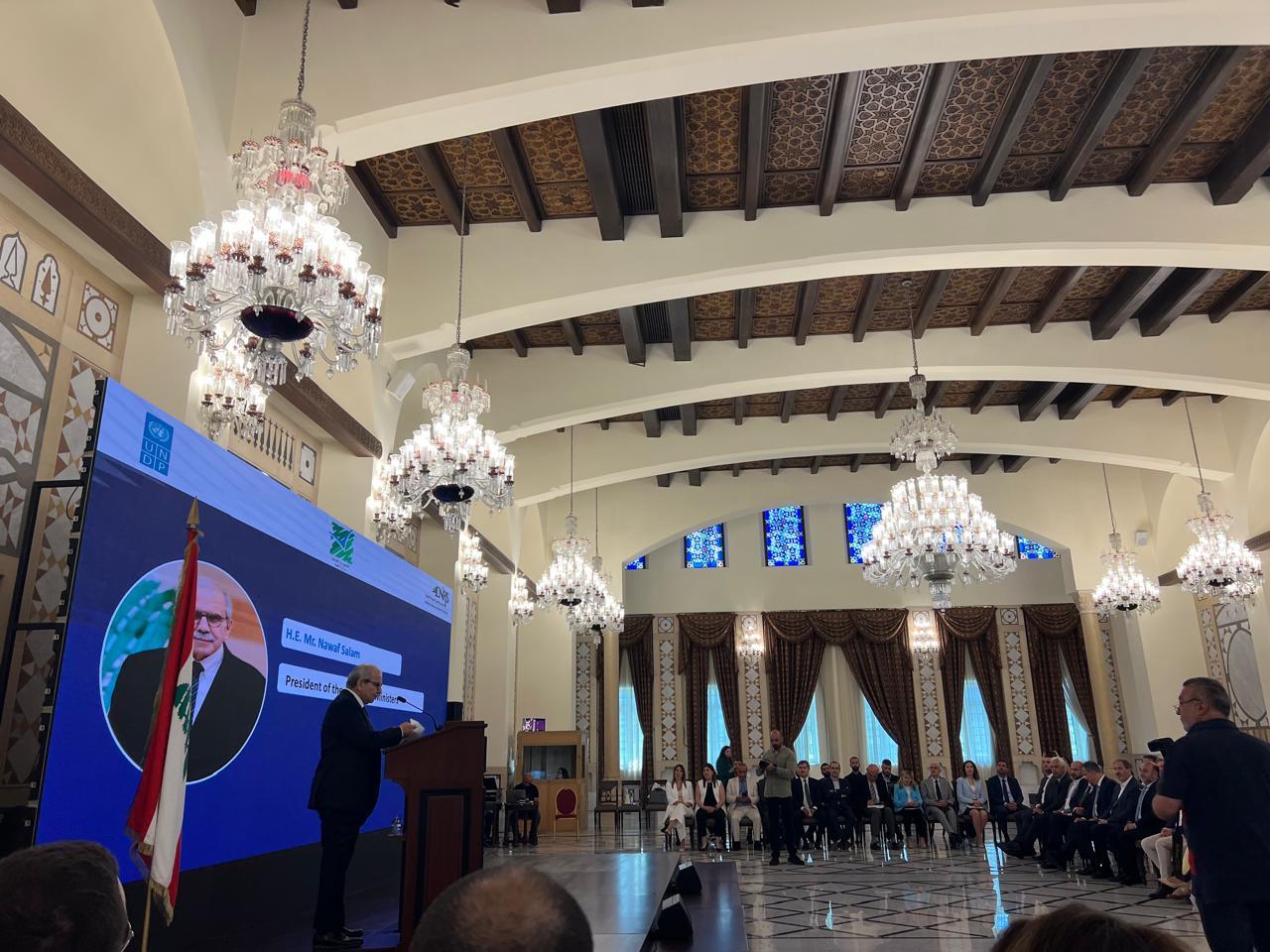
Beirut, Lebanon (Enmaeya News) — Under the patronage of Prime Minister Dr. Nawaf Salam, the “Marine Environment in Lebanon” conference was held Wednesday at the Grand Serail. Organized by the Ministry of Environment in partnership with the National Council for Scientific Research (CNRS) and the United Nations Development Programme (UNDP), the event aimed to highlight the environmental status of Lebanon’s coastline in 2025 and discuss challenges and opportunities in preserving marine biodiversity and enhancing environmental governance.
The conference drew wide participation from ministers, members of parliament, civil society representatives and international stakeholders.
Dr. Chadi Abdallah, secretary general of CNRS, opened the conference, emphasizing the sea’s importance as a pillar of environmental and food security.
“We have achieved significant scientific monitoring and developed an accurate environmental database despite economic hardships and the destruction of research equipment following the Beirut port explosion,” Abdallah said. He called for sustained support for scientific research and its integration with productive sectors, stressing that “marine environmental protection is a national priority that cannot be delayed.”
UNDP Resident Representative in Lebanon Blerta Aliko highlighted the Mediterranean Sea’s vital role in Lebanon’s economy and warned of escalating environmental threats such as rising sea levels and pollution.
“Real change requires sustainable partnerships and strong governance,” Aliko said, reviewing UNDP’s interventions in Lebanon, including updates to the National Biodiversity Strategy and Action Plan, support for climate commitments, and improvements in solid waste management and protected areas.
Minister of Environment Dr. Tamara El-Zein outlined the ministry’s achievements during its first 100 days in office, including foundational and structural reforms.
“We are modernizing administrative structures, initiating digital transformation, developing a roadmap for the blue, green and circular economy, and reinforcing environmental governance,” she said. El-Zein also noted Lebanon’s recent signing of the Biodiversity Beyond National Jurisdiction agreement.
Prime Minister Salam reaffirmed the government’s commitment to marine environmental protection.
“The sea remains an integral part of Lebanon’s identity and a livelihood source for thousands of Lebanese,” he said. “Marine protection is not the responsibility of a single ministry or entity, but a national cause requiring integrated political, scientific and community collaboration.”
The conference featured interactive sessions and thematic presentations highlighting various aspects of Lebanon’s marine environment and related challenges.
A short awareness video titled “It Takes You to the Sea and Brings You Back in Love” was screened, reflecting the emotional and cultural ties Lebanese people share with the Mediterranean.
A panel titled “In the Presence of Blue” explored marine biodiversity and marine nature reserves.
The session “Sea Guardians” focused on grassroots initiatives by citizens, NGOs and institutions to protect the marine environment through beach cleanups, volunteer monitoring and community awareness campaigns.
Kareem Salameh from the Hariri Foundation for Sustainable Human Development delivered remarks on the “Youth and Blue Economy” initiative, thanking the Ministry of Environment for the partnership.
He highlighted collaboration between the foundation, the United Nations Environment Programme and the ministry in conducting Lebanon’s first national blue economy assessment, based on five pillars: economic development, social justice, governance, environment and finance.
“Youth play a pivotal role in transitioning toward a sustainable marine economy through research, innovation and capacity building,” Salameh said. “We are working with partners to turn the national agenda into actionable solutions for marine sectors.”
The final panel, “If You Could Speak, O Sea,” addressed the impacts of climate change on the sea and included the official announcement of the 2025 Lebanese coastline environmental report.
The report presented key data on pollution, water temperature shifts and biodiversity changes.
The conference concluded with an open discussion among participants from various sectors focusing on joint priorities and emphasizing the need for inclusive youth engagement in safeguarding the sea as an environmental, cultural and economic asset for Lebanon.



